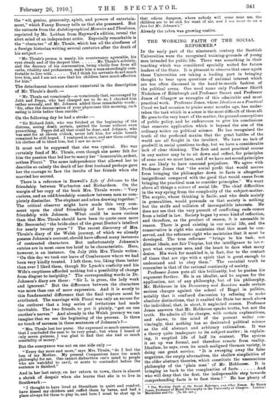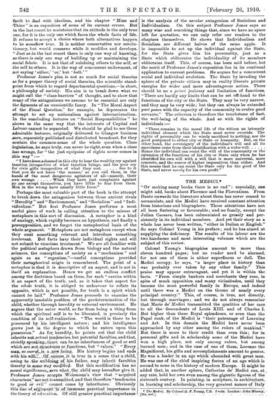THE WORKING FAITH OF THE SOCIAL REFORMER.*
IN the early part of the nineteenth century the Scottish Universities were the recognised training-grounds of young men intended for public life. There was something in their teaching which was considered specially suited for future leaders of the State. It is pleasant to observe that once again these Universities are taking a leading part in bringing thought to bear upon questions of national interest which are too often discussed in the hand-to-month fashion of the political arena. One need name only Professor Shield Nicholson of Edinburgh and Professor Smart and Professor Jones of Glasgow as examples of this admirable and most practical work. Professor Jones, whose Idealism as a Practical Creed we had occasion to praise some months ago, has under- taken the task which in a sense is the most difficult of them all. He goes to the very heart of the matter, the ground-conceptions of public policy, and be endeavours to give his conclusions that concrete application which is beyond the aim of the ordinary writer on political science. He has recognised the truth of the profound maxim that the great battles of the world are all fought in the intellect. We have no lack of goodwill in social questions to-day, but we have a considerable lack of clear thinking. The first and most practical course in any matter may be to sit down and reflect, for principles of some sort we must have, and if we have not sound principles we are likely to have unsound prejudices. We agree with Professor Jones that "the social profit that would accrue from bringing the philosopher down to facts is altogether insignificant compared with the good that would ensue from bringing the practical man to consider principles." We want above all things a science of social life. The chief difficulties in the way spring from the complexity of the subject-matter. The sceptic, whose thinking is facile, and who deals mainly in generalities, would persuade us that society is nothing but the strife and collision of incompatible interests. He does not see that the very pursuit of conflicting ends comes from a belief in law. Society began by some kind of reflection, and therefore, as the product of reason, it is amenable to reason. There is good existing in our social life, and the conservative is right who maintains that this must be con- served, and the reformer right who maintains that it must be developed. The true reformer "brings to his task, not distant ideals, not fair Utopias, but the intelligence to int( r- pret what everyone sees, and the heart to dare what many desire. His work for mankind is, in fact, due to the contact of times that are ripe with a spirit that is great enough to understand and to obey them." The essential truth to remember is that of the rational continuity of society.
Professor Jones puts all this brilliantly, but he pushes his argument further. He is an idealist, and he argues for the application, not of any philosophy, but of his philosophy. Mr. Hobhouse in his Democracy and Reaction made certain serious charges against the school of Hegel in politics, notably that it confused discussion by refusing to make absolute distinctions, that it exalted the State too much above the individual, that, in short, it neglected reason. Professor Jones answers that Mr. Hobhouse speaks truths, but not the
truth. He admits all the charges, with certain explanations, and shows, to the mind of the present writer con- vincingly, that nothing has so desiccated political science as the old abstract and arbitrary rationalism. It was a theory quite inadequate to its subject-matter ; in explain- ing, it emptied life of half its content. The system it set up was formal, and therefore remote from reality. Idealism, he says, even its much maligned German variety, is doing one great service. "It is sweeping away the false negations, the empty alternatives, the shallow simplicities of the older abstract theories, which constitute the unconscious philosophy of the 'plain man' of Mr. Hobhouse. It is bringing us back to the complexities of facts And who will deny that the first, the indispensable step towards comprehending facts is to face them ? " Be has plenty of
• The Working Faith of the Social Reformer, nod etlisr Essays. By Hem Jones, Professor of Moral Philosophy in the University of Glasgow. London : Macmillan and Co. rfs. 13d. net.] Profeseor Joiiea ,eqepts Weitenann'a view that "acquired charactere:' erenektranietitted, and that therefore "tendencies to good or evil" cannot come by inheritance.' Obviously this line of aft-T;refetit...410'ogleinientfe;,Practical. importance in the theory of education. Of still greaterpriCtical imPortanca%,
:fault ;to ,find with ;idealism, .mAl his chapter "Mine and 'whine" is an exposition of some of its eurrent errors. But in the last resort he maintains that its attitude is the only true one, for it is the only one which faces the whole facts of life. It refuses to accept a choice where both alternatives happen to be .soraehow true. It is neither conservative nor revolu- tionary, but would conserve while it modifies and develops. " Juet as in;the last resort there is only one way of knowing, so there is only one way of building up or maintaining the social fabric. • It is not that of subduing others to the self, or the self to others. It is the way of concurrent endowment, of ,
;not saying 'either,' 'or,' but ' e Professor Acones's plea is not so much for social theories as for a proper theory of aocial theories, the scientific stand- point from which to regard departmental questions,—in short, a philosophy of society. His aim is to break down what we• might call the •44 class-barriers" Of thought, and to show that meery.of :the antagonisms we assume to be essential are only the 'figments of An unscientific fancy. In "The Moral Aspect of the Riecal Question," for example, he deprecates the etterupt to set up nationalism against internationalism. In the oencludieg -lectures on "Social Responsibilities" he Ahows in the same way that the interests of Capital and lAbounessmot be separated. We should be glad to see these Adminshle leoteree, originally delivered to Glasgow business %men, separately published and distributed broadcast, for they oontain the- common-sense of the whole question. Class legieletien, he says truly, can never be right, even when a class has wrongs, for "the just equipeise of rights never comes in
this way " :— •
"1 hAve$Aennthemed in this city to hear the wealthy cry against taxatio,n Irreepective of what toxation brings, and the poor cry
for civic gifts irrespective of what they cost See to it that you do not leave 'the masses,' as you call them, in the *Lands af the .most dangerous agitators of all—namely, their
own WZO.ngS. ' . • When they have just complaints against no ;me except t1Aemselves, you have little to fear from them. Men in the wrong have lutuely little force."
Perhaps the most valuable part of the book is the attempt to break down the antagonism between those ancient rivals "geredity "and "Environment," and "Socialism" and "Indi- 44thrliaw:" But first ,Professor Jones performs a most useful piece of work in calling attention to the misuse of metaphors in this aort of discussion. A metaphor is a kind of,ailalogy, which rapidly becomes an hypothesis, and finally a presuppordtion, and we forget the metaphorical basis of the whole argument. "Metaphors are not metaphors except when they omit gennethieg relevant and introduce something irrelevant. gut facts have their individual rights and will not submit-to vicarious f,reatment." We are all familiar with the political metaphors drawn from biology and the natural .0eieeees, the conceptions of society as a " mechanism " and . again as an "organism,"--useful conceptions provided . their metaphorical origin is remembered. 'The point of a metaphor is that it is descriptive of an aspect, and is not in itself an explanation. Hence we get an endless conflict among the doctrines based on them, for each "carries within it an aspect of the truth, and, as it takes that aspect for the 'whole truth, it is obliged to endeavour to refute its opposite, which is not possible, for truth is a spirit which cannot ,be laid." Professor Jones proceeds to examine the apparently insoluble problem of the predetermination of the ohi.ld, whether through heredity or external environment. He argues that the outer world, so far from being a thing from whioh the spiritual self is to be liberated, is precisely the condition er its self-realisation. "The world is there to be possessed by , Iris, intelligent nature; and his intelligence grows just in the degree to which he enters upon this possession." As foe, heredity, he points out that the child inherits not ectual tendencies, but potential faculties, and that, , strictly speaking„there, can he ne inheritances of ,good or evil which are eret,streetueefforfenetions, but values,". "very mail, as enorel,ie, a eneet );e,ing, His history begins and ends with his.),41)4,-At oet931.1;BA.it is true in a sense that a child, owing ,49...thg ,eygdoin$ ,og his, father, may i4erit faculties thereby *4500 woy wpcjileo. But this ;modification .ha s nO
snoral significanee•Aav.q what, the may hereafter give it. is the analysis of the secular antagonism of Socialism and Individualism. On this subject Professor Jones .says so many wise and searching -things that,:aince we have no apace left for -quotation, we can only refer our -readers to the chapters themselves. He :shows that Individualism and Socialism Are different halves of the same apple. It is impossible -to eat up the individual against the State, for the State gives him his personality, just as a State which obliterates the individuality. of its members
obliterates itself. This, of course, has been said before, bat the merit of Professor .Jones's exposition lies -in its continual
application to current •probjems. He argues for a concurrent social and individual e.volution. The State by invading the sphere of the private citizen may in reality liberate private
energies Air wider and more advantageous action. There should be no a priori jealousy and limitation of functions.
"There are hardly any limits that can be set off-hand to the
funotions of the city or the State. They may be very narrow, and they may be very wide; -but they can always be extended pare; passe with the capacity of the community to evolve good servants." The criterion is therefore -the touchstone of fact,
the well-being of the whole. And so with the rights of individuals :— " There remains in the moral life of the -citizen an intensely individual element which the State must never override. The rights of personality can be wisely sacrificed to nothing, nor its good postponed to either city or State or humanity. But, on the other hand, the sovereignty of the individual's will and all its sacredness come from their identification with a wider will Hence the individual can resist the will of the community or the extension of the functions of his city or State only when he has identified his own will with a will that is more universal, more concrete, and the source of higher imperatives -than either. And this means that he can resist the State only for the good of the State, and never merely for his own profit."











































 Previous page
Previous page